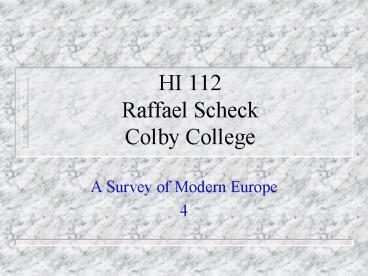HI 112 Raffael Scheck Colby College - PowerPoint PPT Presentation
1 / 30
Title:
HI 112 Raffael Scheck Colby College
Description:
Title: Background Author: for college use only Last modified by: Colby Collge Created Date: 9/12/2000 10:51:06 PM Document presentation format: On-screen Show – PowerPoint PPT presentation
Number of Views:112
Avg rating:3.0/5.0
Title: HI 112 Raffael Scheck Colby College
1
HI 112Raffael ScheckColby College
- A Survey of Modern Europe
- 4
2
The Consolidation of Other Nation States
3
France after 1871
- Modernization and consolidation after 1871
- Attack on local dialects
- Compulsory education
- Mass draft
- Branch railroad building
- Anti-clericalism in the wake of the Dreyfus
Affair - Successful democracy despite instability of
governments
4
Reform in Russia
- Defeat also triggers modernization
- Abolition of serfdom, 1861
- Local parliaments
- Judicial system
- National minorities
- Anti-Semitism
- Revolution of 1905
5
Democratization in Britain
- Electoral reforms of 1832, 1867, and 1881
gradual extension of the suffrage to almost all
adult males - Limitation of the power of the Upper House
- Pride in powerful industrial revolution and
global empire - But nationalist tensions, above all in Ireland
6
Failed Consolidation in Austria-Hungary
- Division of the Austrian Empire, 1867
- Democratization in Austria but not in Hungary
- Separatist nationalisms chaos for Austrian
democracy - Slow industrialization in Austria
- Huge free-trade area but politically unstable
7
Changes in Society 1850-1914
8
Overview
- Industrial take-off on the Continent after 1850
- Population Explosion
- Urbanization and rebuilding of cities
- Effects on the countryside and on worldviews
9
European Population Growth 1800-1900(in millions)
10
Urban Growthin 1000s
11
Growth Rates
12
Urbanization
- Growth in royal residences already before 1800,
but explosion during industrial revolution - Huge challenges feeding, housing, policing,
hygiene, transportation - Demands large administration
13
The Tertiary (White-Collar) Sector
- Huge cities and consolidated states require large
state administrations - Banking, finance, insurance business, services
thrive - Job opportunities for many men and women
- Consumerism department stores
14
The Growth of Organized Labor
- Organization in huge industrial areas
- Housing shortages
- Mass strikes
- Repressive states
- But Trade union movements and socialist parties
begin integrating the workers into the state in
Western and Central Europe - Still fear of revolution
15
Changes in the Countryside
- Markets expand, but foreign competition from the
U.S. and Russia undercuts agriculture - Farmers demand protective tariffs and become a
conservative counterweight to the labor movement - Strategic interests of nation states
16
Changes in Mentalities
- Challenges to organized religion
- Dechristianization?
- Feminization of religion
- Upsurge of individualism
17
Modernism and Modern Thought
18
What is Modernism?
- Rational, scientific, individualistic,
progressive, urbanized form of life in place
around 1900 (in the advanced countries) - But it breeds its opposite irrationalism,
nihilism, cultural pessimism
19
The New Toughness of Mind, 1850-80
- Trend to scientific understanding of all things
human (Marx) - Auguste Comte (1798-1857) Positivism
- Realism in paiting and literature (e. g.
Flaubert) - Charles Darwin (1809-82) and Charles Spencer
(1820-1903) - Shock to romantic and religious minds
20
The Challenge to Rationality
- World full of chaotic, destructive wills
(Schopenhauer) - Friedrich Nietzsche (1844-1900) call for a
transvaluation of all values - Naturalism critique of society and family
(Ibsen, Strindberg. Zola) - Sigmund Freud (1856-1939) exploring the
unconscious
21
Conclusion
- Massive outbreak of irrationalism at the end of
the rational 19th century - But not a romantic irrationalism in the sense of
the richness of feeling - rather anguish,
madness - Search for meaning
22
The Zenith of European Imperialism
23
The New Imperialism Facts and Motivations
- Scramble for colonies 1880-1900
- Deeper penetration and higher investment made
possible by industrial revolution and new
technology - Feeling of cultural superiority and civilizing
mission (the white mans burden) - Nationalism (mass press)
- Demographic and social arguments
- Neo-mercantilism
- Domino effect?
24
The British Empire
25
The French Empire
26
(No Transcript)
27
(No Transcript)
28
Realities of the New Imperialism
- Poor communication and organization
- Failure of the settlement idea
- Limited economic benefits
- Anti-imperialism
29
Informal Empire
- Trading with established but less powerful
states attempts to control their finances and
exploit their economies - Examples Ottoman Empire, China, Latin America,
maybe Russia?
30
The Human and Cultural Cost
- Destruction or disruption of cultures
- Forced labor under abusive conditions
- Divisions within colonized peoples massacres
in response to uprisings - Europeanization of the globe?
- But also powerful foreign influence on Europe































